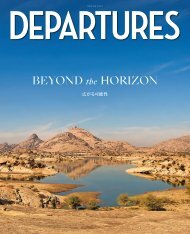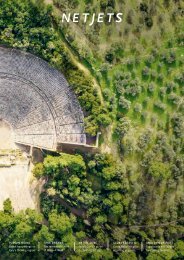Create successful ePaper yourself
Turn your PDF publications into a flip-book with our unique Google optimized e-Paper software.
Imagine rows and rows of white tents, as<br />
far as the eye can see, side by side. Each<br />
may have ten to fifteen family members<br />
living together in the same space. It is<br />
their only world.”<br />
Domitille Lagourgue, Director of Mission<br />
Enfance, who has just returned from Iraq,<br />
is describing the multitudes of displaced<br />
refugees living on Iraqi soil, among them<br />
more than 16,000 in the camp of Sharya,<br />
in Iraqi Kurdistan. “They cannot remain in<br />
these camps indefinitely because their entire<br />
family structure is destabilized,” she says.<br />
“The father, who might be a farmer, loses his<br />
paternal authority, his role as the breadwinner.<br />
All he has is a meal ticket.”<br />
Which is why the French and Monégasque<br />
organization Mission Enfance has a deepseated<br />
commitment that goes beyond giving<br />
aid to devastated, war-torn areas. “Our<br />
leitmotif has always been rehabilitation. We<br />
Children at a<br />
Colombian school,<br />
that has benefitted<br />
from Mission<br />
Enfance’s aid<br />
encourage people to wait out the conflict<br />
instead of fleeing and try to help them return<br />
to the place where they were born,” says<br />
Lagourgue. “Of course, we can’t send villagers<br />
back to a dangerous place under bombardment.<br />
But once they’re able to return to their homes<br />
– which are often in very remote places – we<br />
give them access to food, medical treatment<br />
and, most importantly, we build schools.”<br />
Lagourgue, an engaging, energetic<br />
woman with lively eyes and mellifluous<br />
voice, sits behind a wooden desk piled with<br />
papers, notebooks, and Post-it Notes stuck<br />
to the computer screen. Here and there are<br />
framed photos of her with a team, visiting<br />
construction sites or talking to children.<br />
It is almost hard to imagine how so many<br />
complex international projects originate from<br />
this modest office, hidden away in Monaco’s<br />
modern district, Fontvieille.<br />
“School is a center of life, a place where<br />
a terrorized child, who may have lost his<br />
parents or his home, will be distracted. We try<br />
to open their minds and bring them beyond<br />
their suffering, so that they can experience<br />
their childhood.”<br />
The plight of refugees is, in fact, nothing<br />
new to Lagourgue. In 1986, along with<br />
her husband, Edouard, and their two small<br />
daughters, she moved from Paris to live for<br />
two years in Peshawar, Pakistan, near the<br />
Afghan border. “It was during the political<br />
unrest of the Soviet-Afghan war,” she<br />
explains. “At the time, we were based at the<br />
French humanitarian refugee camp staffed by<br />
organizations like Médecins Sans Frontières.<br />
We made incursions into Afghan territory,<br />
even though the borders were closed.”<br />
Working as a journalist for French<br />
publications including L’Express and La<br />
Croix, Lagourgue witnessed the migration of<br />
millions of Afghans who fled to Pakistan or<br />
Iran. “Every day, we saw caravans of camels<br />
with families, carrying all their belongings,”<br />
she recalls. “It was massive.”<br />
In 1991, she relocated to Monaco, teaming<br />
up with a Monégasque priest, Father Stéphane<br />
Aumonier, who co-founded Mission<br />
Enfance. “At the time, Prince Rainier III was<br />
looking to expand humanitarian associations.<br />
It gave us an opportunity to continue what<br />
we’d already begun in Afghanistan and to<br />
pursue an ideal that we believed in.”<br />
Combining this association with<br />
Lagourgue’s widespread network, the<br />
small-scale organization quickly achieved<br />
impressive results. To date, Mission Enfance<br />
helps children who would otherwise never<br />
have the possibility to attend school in places<br />
including Afghanistan, Armenia, Burkina<br />
Faso, Colombia, Iraqi Kurdistan, Laos,<br />
Lebanon, Syria, and Vietnam.<br />
In contrast with other humanitarian<br />
organizations with more substantial budgets,<br />
Mission Enfance focuses on projects in<br />
isolated areas in the desert or the countryside<br />
where larger NGOs don’t often venture.<br />
“With €1.5 million, we build ten new schools<br />
each year,” Lagourgue says. “In 28 years,<br />
we have educated more than 1 million and<br />
taught them to read and write.”<br />
Their annual budget also covers a variety<br />
of community programs: Among them, the<br />
creation of ten educational centers with game<br />
and toy libraries, six orphanages, a nursery,<br />
and ten health clinics.<br />
These days, under the Honorary Presidency<br />
of HSH Prince Albert II, the Principality<br />
of Monaco finances 80% of the charity’s<br />
operations, while private donors contribute<br />
the remaining 20% of the funding. With only<br />
three permanent employees, 50 local workers<br />
in the field and approximately 35 volunteers,<br />
the low cost for internal operations is clearly<br />
significant. “For a donation of €100, we send<br />
€99.40 to the project area and take out next<br />
to nothing,” affirms Lagourgue with a smile.<br />
“We have 4,000 private donors, mostly in<br />
France and Monaco. They know that their<br />
money is going directly to the field.”<br />
XXXXXXXXXXXXX<br />
“School is a centre of life,<br />
a place where a terrorised<br />
child will be distracted”<br />
11 NetJets


















